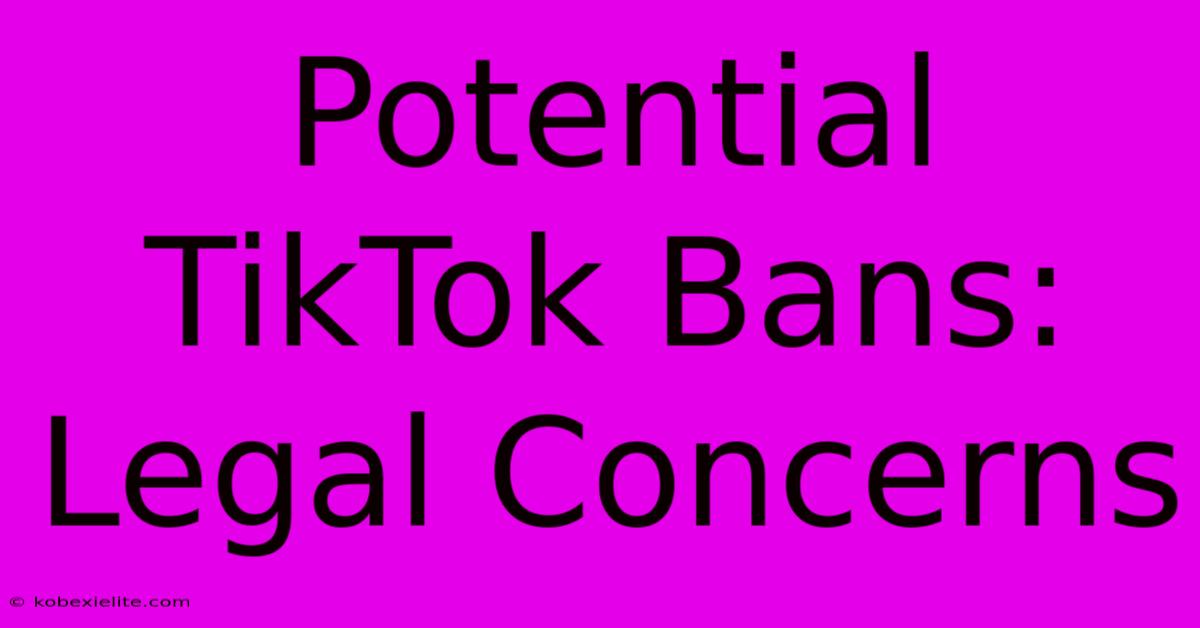Potential TikTok Bans: Legal Concerns

Discover more detailed and exciting information on our website. Click the link below to start your adventure: Visit Best Website mr.cleine.com. Don't miss out!
Table of Contents
Potential TikTok Bans: Legal Concerns
The potential banning of TikTok in various countries raises significant legal concerns, touching upon issues of free speech, national security, and international trade. This article explores the complex legal landscape surrounding these bans and the arguments for and against them.
The First Amendment and Free Speech
In the United States, the First Amendment guarantees freedom of speech, a right that extends to online platforms. A blanket ban on TikTok could be challenged on the grounds that it violates this fundamental right. However, the Supreme Court has established that this right is not absolute and can be subject to reasonable restrictions. The crucial question becomes whether a ban on TikTok constitutes a reasonable restriction. Proponents of a ban might argue that national security concerns outweigh free speech considerations, while opponents would argue that a ban is overly broad and disproportionate. The line between legitimate national security concerns and censorship is blurred and will be heavily litigated.
Arguments Against a Ban Based on Free Speech:
- Overbroad Restriction: A ban impacts not only the Chinese company ByteDance but also millions of American users who utilize the platform for various purposes, including expression, entertainment, and business.
- Lack of Proportionality: A complete ban might be considered disproportionate to the alleged security risks. Targeted measures, such as data security audits and stricter regulations, could be a less restrictive alternative.
- Discriminatory Impact: A ban targeting a specific platform based on its country of origin could be seen as discriminatory and potentially violate equal protection principles.
National Security Concerns and Data Privacy
The primary justification for potential TikTok bans often centers around national security concerns. Governments worry about the potential for the Chinese government to access user data through ByteDance, posing risks to national security and intellectual property. This concern is amplified by China's national security laws, which could compel ByteDance to share data with the government.
Arguments For a Ban Based on National Security:
- Data Security Risks: The argument hinges on the potential for the Chinese government to access user data, including sensitive information.
- Influence and Propaganda: Concerns exist about the platform's potential for spreading misinformation and propaganda.
- National Infrastructure Vulnerabilities: There are concerns about the potential for TikTok to be used to compromise national infrastructure.
International Trade Implications
Bans on TikTok also have implications for international trade. Such actions could trigger retaliatory measures from China, potentially impacting other American companies operating in the Chinese market. These trade disputes can escalate and harm the global economy. The World Trade Organization (WTO) rules on non-discrimination could be relevant in any potential international legal challenges.
Economic Ramifications of a Ban:
- Retaliatory Measures: A ban on TikTok could lead to China imposing similar restrictions on American companies.
- Investment Losses: American businesses that rely on TikTok for marketing and advertising could experience significant financial losses.
- Job Losses: A ban could result in job losses in the United States, particularly in the technology and content creation sectors.
The Legal Challenges Ahead
Any attempt to ban TikTok will likely face significant legal challenges. The legal battles will focus on the balance between national security concerns, free speech rights, and international trade obligations. The outcome will likely shape the future of social media regulation and the relationship between technology companies and governments worldwide. The legal challenges will involve complex questions of jurisdiction, evidence, and interpretation of national and international laws. This is not merely a domestic issue; it is a global one with significant ramifications for the digital economy and international relations. The upcoming legal battles promise to be complex and long-lasting, with significant implications for users, companies, and governments alike.

Thank you for visiting our website wich cover about Potential TikTok Bans: Legal Concerns. We hope the information provided has been useful to you. Feel free to contact us if you have any questions or need further assistance. See you next time and dont miss to bookmark.
Featured Posts
-
Ufc 311 Dvalishvili Vs Nurmagomedov Result
Jan 19, 2025
-
Alabama Wins Tight Game Against Kentucky
Jan 19, 2025
-
Chiefs Overcome Texans
Jan 19, 2025
-
Fox Denies Brady Retirement Rumors
Jan 19, 2025
-
Jahmyr Gibbs Speed 40 Time
Jan 19, 2025
